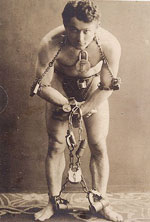Harry Houdini is being celebrated at the Jewish Museum in New York. He should be, as a representative of skill, achievement, and rationality, and as opponent of the fraud of spiritualism.
The Stanton Peele Addiction Website, December 5, 2010. This blog post also appeared on Stanton's Addiction in Society blog at PsychologyToday.com.
What Harry Houdini Says About Judaism
 As Chanukah is celebrated in 2010, the Jewish Museum in NYC celebrates the brilliance and the significance of Harry Houdini.
As Chanukah is celebrated in 2010, the Jewish Museum in NYC celebrates the brilliance and the significance of Harry Houdini.
Houdini was born in Budapest, Hungary as Ehrich Weisz in 1874, but moved as a child to Appleton Wisconsin with his rabbi father. But Ehrich was footloose, running away from home at 12, then rejoining his family when it moved to New York City.
By age 17 he was a full-time magic performer; at age 19 he married a shiksa, Bess, who helped direct his career and to whom he remained devoted his entire life. They lived together in New York - with Harry's mother, to whom he also remained devoted. (Did I mention Houdini was Jewish?) There's a psychodrama right there. He remained in mourning for the rest of his life after his mother died.
Houdini's name is associated with magic - and erroneously (as we shall see) with spiritualism. But he was an escape artist. Through trickery and immense physical strength and agility - and unbelievable guts and chutzpah - Houdini made himself the most famous performer in the world at the beginning of the last century.
Houdini's publicity stunts are legend. He would immediately go to the local police station in a new town (including Scotland Yard in London) and ask the police to restrain him with handcuffs or in a cell - from which he inevitably escaped - partly through physical dexterity, partly through secreting skeleton keys on his person (we will not say where - he often performed these stunts nude - oh, he had very thick hair).
His most celebrated public displays were being dangled at great heights in a straight jacket and chains. He plunged into rivers similarly bound (Houdini developed an acute ability at holding his breath). His stage act involved him being immersed in a water-filled container and then hidden behind a curtain. Although he escaped within minutes, he would remain out of sight for a half hour. After the War, he was visibly immersed in water in a glass tank.
At an early point in his career, Houdini was fascinated by spiritualism and communicating with the dead. But he quickly became disillusioned as he attended séances and noted the tricks the mediums utilized. He wrote a best-seller revealing these frauds - "A Magician Among the Spirits" - and testified before Congress against the widespread spiritualism then prevalent in America (like it is now ).
"I respect every genuine believer in spiritualism or any other religion...But this thing they call spiritualism, wherein a medium intercommunicates with the dead, is a fraud from start to finish...In thirty-five years, I have never seen one genuine medium."
In his stage act after WWI, Houdini devoted part of his show to uncovering the fakery of spiritualism. Houdini offered a standing $10,000 reward to anyone who could produce a phenomenon not explicable by the laws of physics - he never had to pay out.
However, early in his career, barnstorming the United States, Houdini indulged in a bit of hornswoggling himself. When he arrived in town, he would go to the cemetery, there to pick up crucial local news events, like the deaths of children. He noted a young couple whose son had died in his audience one evening, pretended to talk to their son, and "revealed" that the boy told him that he was glad they were expecting another child (Houdini figured as a young couple, they would quickly bear more children).
Houdini never forgave himself for the trick. Not being able to bear the burden of the memory, years later he wrote the couple revealing his fraud.
That's how Houdini differs from many modern therapists and psychologists - Dr. Phil, for instance, has James van Praagh on his show and takes him seriously (of course, he's not Jewish), while PT blogs contains the ramblings of a famous psychologist who believes spiritualists can avoid having their images captured on cameras! And - needless to say - Harry would not support moronic, life-threatening movements like the anti-vaccination efforts of Jenny McCarthy and Jim Carrey, as Chelsea Handler does.
Houdini stood for the value of rationality, empiricism, self-discipline, and self-improvement on earth. He had his problems (remember his wife and mother living in the same house). But superstitious irrationality was not one of them.





